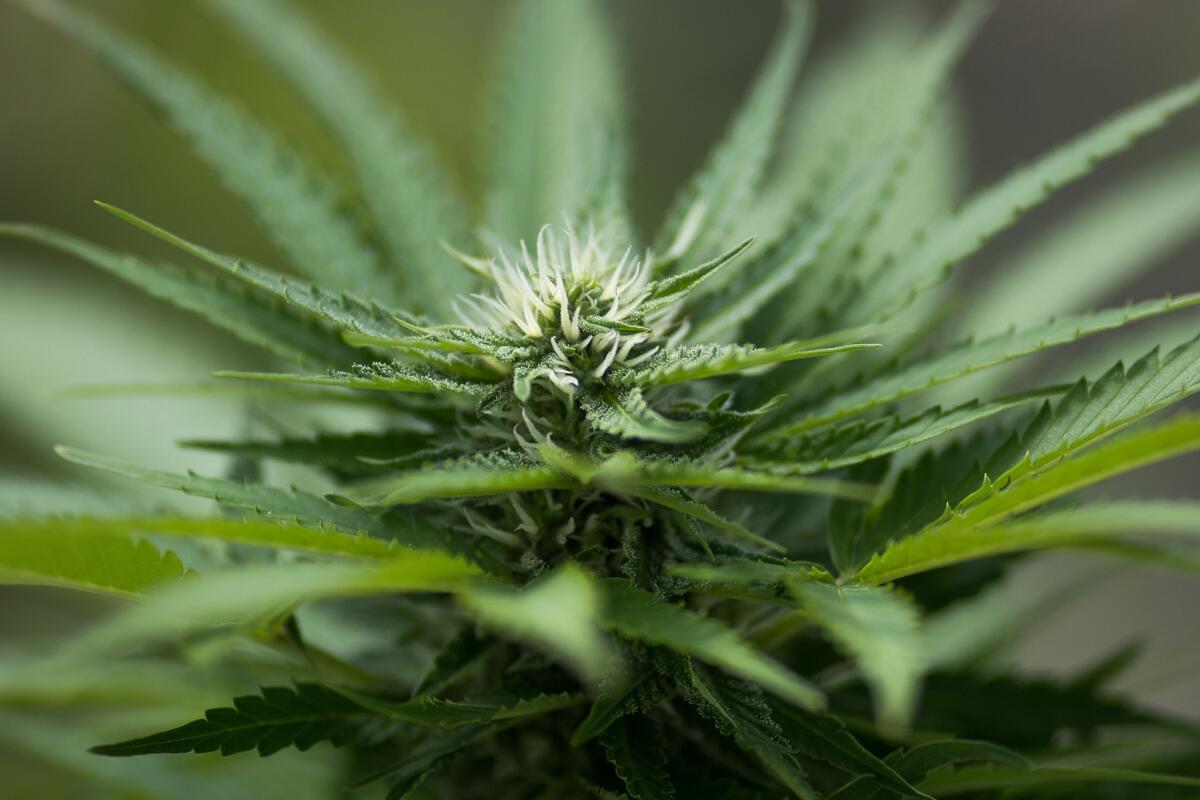La Cañada sets rules for massage parlors, indoor marijuana cultivation

Cannabis plants grow in the greenhouse at Vireo Health’s medical marijuana cultivation facility, in this file photo taken on Aug. 19, 2016 in Johnstown, New York.
Stronger oversight over massage parlors and regulations for indoor personal marijuana cultivation both received approvals from the City Council Tuesday night.
The massage business ordinance approvals, as recommended by the Planning Commission in November, came in three separate unanimous votes: one to approve the new definitions for granting conditional use permits for massage businesses within the Downtown Village Specific Plan; to repeal and replace a chapter of the city’s zoning code that regulates massage businesses, and to repeal the citywide 22-month and 15-day moratorium on issuing new licenses for these businesses.
The jurisdiction of massage-related businesses fell under the purview of local municipalities until 2009, when a state law was passed establishing the California Massage Therapy Council to oversee regulation and licensing.
Join the conversation on Facebook >>
That bill expired on Jan. 1, while another approved last year by Gov. Jerry Brown, the Massage Therapy Act (AB 1147), put the power of regulation and enforcement back in the hands of city officials. On April 20, 2015, La Cañada adopted a 45-day moratorium on issuing any permits on massage businesses. In June of that year, the city extended that moratorium for 22 months and 15 days.
The city’s ordinance updates address the growth and associated criminal problems of the industry in other cities, which occurred mostly between 2009 and 2014, according to the staff report. The massage industry in other cities has been associated with prostitution and human trafficking.
According to Susan Koleda, deputy director of community development, if a massage business violates its conditional use permit, it cannot operate for two years.
“We found that if one shut down, another would open up with a different owner, but the same criminal activity would occur,” she said.
Massage business operators, now established under the ordinance as “technicians,” must also be certified with the state Massage Therapy Council and the state licensing board receive a background check and documents of the required training. Koleda told council members that existing establishments in the city will be grandfathered in and not need a conditional use permit, but the technicians working there need the certification.
Indoor marijuana growing regulations
The City Council, with some reluctance, approved the regulations for indoor personal marijuana cultivation in a 5-0 vote.
“I’m personally disappointed this proposition [64] passed in the election,” said Councilman Dave Spence. “This is a gateway drug. We all know that.”
On Nov. 8, the same night same night that Proposition 64 passed, legalizing personal marijuana use, possession and cultivation, the local proposal was given the green light during a Planning Commission meeting to move forward to the City Council.
City Atty. Mark Steres said small marijuana businesses operations in California need licensing and the agencies and state mechanisms to get a business license can take about a year.
“The state law does allow local governments to prohibit all commercial activity,” he said. “Prior to Prop. 64, medical marijuana use has been permitted in the state of California. As 2017 progresses and as activities unfold, we may want to revisit commercial operations, but in La Cañada Flintridge, commercial operation of marijuana is prohibited.”
The maximum number of marijuana plants allowed to be grown in a city residence is up to six, and the plants need to be grown within 50 square feet.
A cultivation permit can be issued to a property owner first with an application submission and an inspection by the Department of Building and Safety and the L.A. County Fire Department. Inspections will be done annually when permits are renewed.
The cost for a cultivation permit will come up for a discussion at the Dec. 20 City Council meeting.
Director of Community Development Robert Stanley said his department has received just one phone call inquiring about indoor marijuana cultivation.
According to the La Cañada Flintridge ordinance, property owners cannot have more than 28.5 grams of cannabis growing. Spence expressed concern that local indoor growers could cultivate more to “provide to their buddies.”
“It boils down to enforcement,” said City Manager Mark Alexander. “We’d have LASD go out and do some inspections. Without a warrant they can’t go in and inspect the plants.”
Walker reminded that she is concerned about mobile delivery services and medical marijuana buyers with legitimate purposes, such as if they are bedridden, and wants to bring that up for future discussion.
“I would hate to see people at a disadvantage while their neighbor may be growing it next door for personal reasons,” she said.
Mayor Pro Tem Mike Davitt said that like Spence, he is concerned about the passing of Proposition 64, but likes that the city is being proactive to regulate “something we can’t forbid.”
Mayor Jon Curtis said he too is disappointed that the proposition passed.
“Some cities say they’re going to make a lot of revenue,” Curtis said. “I think we’ll be revisiting that in terms of opening up storefronts. It can become open season for any cultivation.”
Sanderson is a contributor to Times Community News.